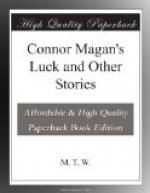The colony is called Twinrip possibly the short of “Between Strip.” (If the name does not mean that, will some one skilled in digging up language roots, please tell me what it does mean?) The atmosphere around these cabins is as filled with bustling, whistling confusion as a chimney with smoke.
Besides the water highway, on the other side, just a few feet beyond the iron roads, a horse-car track and a turnpike offer additional facilities for locomotion. Birds perch on the numerous telegraph wires amid wrecks of kites and dingy pennons—once kite-tails—nothing hurts them; and below the children of Twinrip appear just as free and safe, and seem to have as much delight in mere living as their feathered friends.
The Magans were a light-hearted Irish family, whose cheerfulness seemed better than eucalyptus or sunflowers to keep off the fever and ague, and who made the most of the little bits of sunshine that came to them. Tim, a strong-armed laborer, was brakeman on the Road. His wife, a hopeful little body, a woman of expedients, was voted by her neighbors the “cheeriest, condolingest” woman in Twinrip.
Good luck, according to her, was always coming to the Magans. It was good luck brought them to America—by good luck Tim became brakeman. It was good luck that the school for Connor was free of expense, and so convenient.
Her loyalty to her husband rather modified the expression of her views, yet she often expatiated to her eldest on his advantages, beginning, “There’s your father, Connor—I hope you’ll be as good a man! remember it wasn’t the fashion in the ould country to bother over the little black letters—people don’t have to read there—but you just mind your books, and some day you may come to be a conductor, and snap a punch of your own.”
No doubt Connor made good resolutions, but when he sat by the window in the school-room and looked at the dimpling, sparkling river, so suggestive of fishing, or at the green trees filled with birds, he was not as devoted to literature as a free-born expectant American citizen ought to be. The teacher was somewhat strict, and it may have been in some of her passes with Connor, the “bubblingoverest” of all her youngsters, that she earned the name of a “daisy lammer.”
But the boy knew some things by heart that could not be learned at school. To his ear, the steam whistle of each boat spoke its name as plainly as if it could talk. He need not look to tell whether a passing train was on the O. & M. or on the I.C. & L. He knew the name of every fiery engine, and felt an admiration—a real friendship for the resistless creatures.
To climb a tree was as easy for him as if he were a cat; there were rumors that he had worked himself to the top of the tall flag-staff—which was as smooth as a greased pole—but I will not vouch for their truth. He could swim like a duck, and paddled about on a board in the river till an ill-natured flat-boatman often snarled out that “that youngster would certain be drowned, if he wasn’t born to be hanged.”




